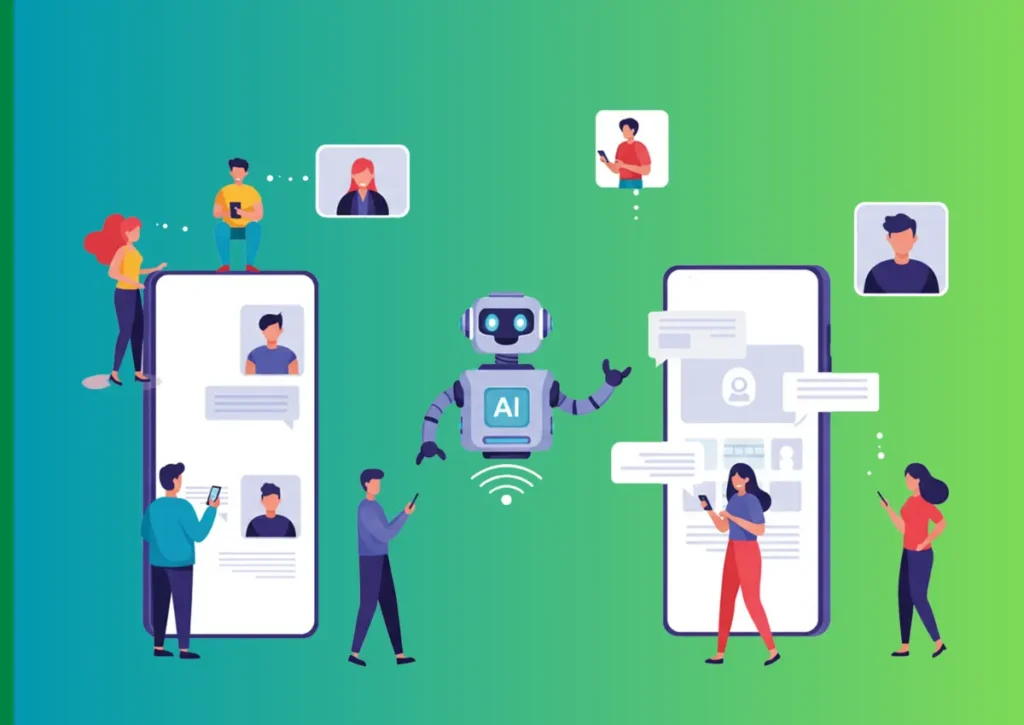The Indian retail market is undergoing a radical change. Artificial intelligence may seem like a cutting-edge technology but it is already at work, behind the scenes at all your favorite shopping and delivery services and even good old-fashioned brick-and-mortar shops.
Whether it is telling us what we are going to buy next or making sure that our packages are delivered to the right place on time, AI is now the invisible hand that is transforming the way Indians endure their shopping and businesses are functioning.

Know the reality of AI in Indian Retail
AI in the retailer does not only mean fancy chatbots or recommendation engines. It is essentially transforming how customers are perceived, how inventories are dealt with and how experiences are staged by businesses. Starting with the top Indian retailers, they are using AI in a bid to engage in hyper-personalized shopping experiences that are well beyond any demographic targeting.
A case in point is Myntra. All the features of their app, including search results and the arrangement of the home page, are driven by the algorithm of machine learning. Vindhya Shanmugam, Senior Director of Engineering at Myntra, comments that their AI would not simply advise what you purchased but rather trace your flavor proclivities, micro-conducts, and instantaneous trends on how to generate a custom-made experience.
That degree of individualization implies that the product feeds for two 20-year-olds in Mumbai could be entirely different, whereas the two may be similar in terms of demographics. The AI knows that shopping tastes are highly personal and are dependent on such things as lifestyle, sense of fashion and trends but not necessarily age or place of location.
Smart Inventory Management Across Categories
The use of AI is much wider than fashion. Artificial intelligence is enabling consumer electronic brands such as Panasonic to forecast the demand trend in various regions. The Deputy GM, Bhupender Gupta, at Panasonic indicates how they apply AI to learn seasonal changes with the awareness that the ceiling fans will not be sold in Himachal Pradesh like in Mumbai.
In a festival period where stocks sell well, such as Diwali, AI assists stores to balance inventory to create a favorable balance between adequate stocks that satisfy the demand and doing away with over-inventorying the store. The system then uses historical sales, weather patterns, regional flavours and local events to predict demand in an extremely accurate manner.
This local intelligence is essential, especially in a diverse market such as that of India, in which customer tastes may hugely differ according to states and/or cities. AI allows the retailer business to make their inventory choices based on local preferences and seasonality and to optimize to minimize waste and maximize profit.
Customer Service and Support
An improvement in the AI-driven customer service is perhaps the most observable transformation in the context of consumers. Contemporary retail chatbots are now way beyond the FAQ responses, as they have acquired advanced qualities of a shopping assistant and stylist.
The AI of Myntra, as an example, is able to interpret natural language questions such as the following: What do I wear to a beach wedding? and give appropriate dressing advice. It is a new conversational AI that is based on large language models like ChatGPT, but it is tuned differently to address fashion and shopping requests.
According to industry experts, these smart assistants already process 70–80 percent of customer care requests on multiple platforms. They are not merely automating the responses, but they are creating intelligence in order to contextualize, problem solve and even predict customer needs way before problems occur.
Optimization of Delivery and Logistics
Optimized logistics and delivery is one of the biggest applications of AI in Indian retail. With the help of AI solutions, Shipway, created by Unicommerce, has made shipping a visible front-stage experience and has pushed shipping as a part of the brand experience.
Their system maps courier performance not just by cost or proximity, but by success rates and delivery speed in specific locations. If one courier service performs better in Delhi but struggles in Pune, the AI automatically reallocates packages to optimize delivery success rates.
The technology also tackles one of e-commerce’s biggest challenges: failed deliveries. Using AI-powered WhatsApp messages, SMS, and voice calls, the system can auto-correct addresses, reschedule deliveries, and resolve issues before packages are returned to origin—a costly problem for retailers.
Perhaps most importantly, AI helps predict which orders are likely to be returned or rejected based on customer behavior patterns. This predictive capability allows retailers to take preventive measures, such as suggesting prepaid options for customers with a history of cash-on-delivery cancellations.
The Implementation Challenge
Despite its benefits, implementing AI in retail isn’t straightforward. Rakesh Kumar, Co-Founder at Appstrail, emphasizes that many brands jump into AI without proper foundational readiness. The challenge isn’t the technology itself but having clean, organized data and well-mapped processes.
Successful AI implementation requires starting small with pilot projects, involving business users early in the process, and ensuring the technology team doesn’t operate in isolation. The key is building systems that users are ready to adopt, rather than impressive technology that sits unused.
Data Quality and Continuous Learning
The success rate of AI is wholly determined by the accuracy of information that is fed into the systems. As Panasonic Gupta observes, AI data is only as smart as the data that one feeds to it. This implies that the retailers will be under pressure to constantly audit and optimize their AI systems to guard against bias and ensure accurate forecasts.
Such major firms have integrated an ongoing feedback loop into their AI systems. Each new fashion, the appearance of a new product, and a new habit of customers is the chance to retrain and optimize the system. Such a continuous education process is necessary to keep AI effectiveness in the ever-evolving retail world.
What is the Future of AI in Indian retail?
As one looks into the future, AI in Indian retail will only get more advanced. It is possible to predict the availability of sophisticated visual search options that enable customers to search and locate products by only uploading photographs, in-the-moment personalized promotions which become available as customers navigate a brick-and-mortar store, and more precise demand planning that considers social media trends and the effects of influencers.
The assembly of AI and new technological breakthroughs such as augmented reality and voice commerce will achieve a completely new shopping experience. You can pretend to put on the clothes, wearing them in augmented reality with the AI fit suggestions or have an intelligent voice assistant who is aware of your style and knows about your financial capabilities.
Final advice by GI tech experts
AI at the Indian retail stage has stepped very far out of the stage of experimentation. It has turned into a business lifeline in terms of competition, changing the face of doing business and shopping. Retail is one of the most AI-powered environments, touching on everything, including personalized suggestions and predictive logistics.
Adopting AI just because it has been hyped in no way is likely to be the key to success, and the strategic trick is to think carefully about what business issues one will thus improve and how it will lead to the improvement of recent customer experiences. Retailers that court AI in a strategic manner are bound to fare well in the dynamic Indian retail environment as the technology advances.
FAQs
How is AI being used in Indian retail stores?
There is the development of AI-based custom product suggestions, stocking, demand holding, chatbots, delivery schedules, and predictive analytics to avert delivery and fraud.
Which Indian retailers are successfully using AI?
Major players like Myntra and Panasonic and logistics companies like Shipway are implementing AI across various functions from personalization to supply chain optimization.
What are the main benefits of AI in retail?
These are the opportunities to provide better personalization of customers, managing inventory, operational costs reduction, customer services, pricing, and supply chain operations optimization.
How does AI improve the shopping experience?
AI creates personalized product recommendations, provides intelligent customer support through chatbots, enables better search functionality, and ensures faster, more reliable deliveries.



